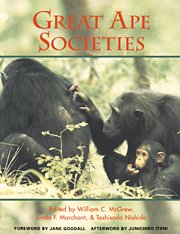Book contents
- Frontmatter
- Contents
- List of contributors
- Preface
- Foreword: conserving great apes
- Part I Apes overviewed
- Part II Social ecology
- Part III Social relations
- Part IV Minds
- 12 Conflict as negotiation
- 13 Language perceived: Paniscus branches out
- 14 Reciprocation in apes: from complex cognition to self-structuring
- 15 Chimpanzee intelligence in nature and in captivity: isomorphism of symbol use and tool use
- Part V Apes compared
- Part VI Modeling ourselves
- Afterword: a new milestone in great ape research
- Appendix: great ape study sites
- Index
12 - Conflict as negotiation
Published online by Cambridge University Press: 04 August 2010
- Frontmatter
- Contents
- List of contributors
- Preface
- Foreword: conserving great apes
- Part I Apes overviewed
- Part II Social ecology
- Part III Social relations
- Part IV Minds
- 12 Conflict as negotiation
- 13 Language perceived: Paniscus branches out
- 14 Reciprocation in apes: from complex cognition to self-structuring
- 15 Chimpanzee intelligence in nature and in captivity: isomorphism of symbol use and tool use
- Part V Apes compared
- Part VI Modeling ourselves
- Afterword: a new milestone in great ape research
- Appendix: great ape study sites
- Index
Summary
INTRODUCTION
Many animals, both primates and non-primates, are characterized by permanent associations between individuals with partly conflicting interests. While the existence of these associations must mean that the parties gain from them, this does not imply that competition has disappeared. Often, animals continue to compete over resources, such as food and mates, despite association and cooperation.
For such an arrangement to work, aggressive conflict needs to be controlled and regulated so that it does not undermine relationships. Paralleling interspecific symbiosis and mutualism, individual members of groupliving species appear to enter ‘social contracts’ that optimally represent their respective interests. No doubt, some of these compromises have been worked out at the genetic level, in the course of evolution, but negotiations about the terms of a relationship may also take place as a social process. The present paper seeks to lay out a heuristic framework from which to conduct research in this area.
In order to do so, I will first critically review the current state of two approaches to social conflict: one by psychologists and social scientists, the other by evolutionary biologists. Traditionally, these frameworks have neglected the contractual perspective: not because the idea of compromise and negotiation is alien to these fields of science, but because of continued adherence to a dichotomy between aggressive competition and sociality.
- Type
- Chapter
- Information
- Great Ape Societies , pp. 159 - 172Publisher: Cambridge University PressPrint publication year: 1996
- 35
- Cited by

